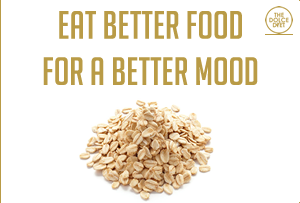Eat Better Food for a Better Mood
Samantha Coogan, MS, RDN, LD
Ever feeling a little off or extra irritable? There are tons of factors that can affect your mood; your job, spouse, kids, friends, family, health and the list goes on. However, there may be a way to at least alleviate some of the irritability in your day with proper food choices. Many people don’t realize how much vitamins and minerals affect the production of certain hormones like serotonin or dopamine. Here are some great tips for improving your mood!
Pair Carbohydrates with Protein
Be sure to choose a carbohydrate source that is high in fiber, such as oats or fruit with the skin, and pair it with a protein source to decrease the absorption of sugar into the bloodstream, in turn controlling your mood swings. If we simply eat fruit on its own, blood sugars will spike rapidly (this does not mean you will get “fat” from eating fruit alone – we are strictly talking about healthy blood sugar here). Almost all hospitals will not serve fruit alone to a patient as a snack. Nurses are there to make sure they eat the protein source provided with it.
We tend to get cranky when blood sugars fall too low, and when they are too high we run the risk of a severe crash later on. So controlling blood sugar is a key component to a healthy mood. Try our Egg Scramble (eggs and fibrous veggies), our Breakfast Bowl (oats, almond butter and fruit) or Blueberry Madness (Greek yogurt and fruit) for perfect carbohydrate/protein pairings!
(Recipes can be found in The Living Lean Cookbook)
Omega-3
Studies have shown a link between high omega-3 consumption and the prevention of depression. Omega-3 content is highest in the brain compared to the rest of the body. (A big reason why we recommend foods rich in Omega-3s for children in the growing years to ensure proper brain development). Omega-3s are abundant in fatty fish (salmon), flaxseeds, avocado, and walnuts. There are even eggs available now that have been fortified with Omega-3s.
Folic Acid
Other studies have also found a link between low folic acid levels and depression. The B vitamin is not only important for energy metabolism, but for hormonal regulation as well. Folic acid is abundant in dark, green leafy vegetables, oranges, oats, and seeds.
Magnesium
Magnesium helps control the release of serotonin (the “feel good” hormone). Incorporating more magnesium into your diet may keep you in a happy state of mind for the rest of the day. Foods high in magnesium include beans, chickpeas, brown rice, quinoa and oats. Magnesium also helps fight water retention! Who wouldn’t be in a better mood if they didn’t look and feel bloated?
Vitamin B6
Vitamin B6 plays a large role in the release of dopamine. Dopamine is a neurotransmitter that regulates the pleasure/reward center of the brain. B6 helps the body produce more of this hormone. Again, chickpeas, brown rice, quinoa and oats are excellent sources of B6.





